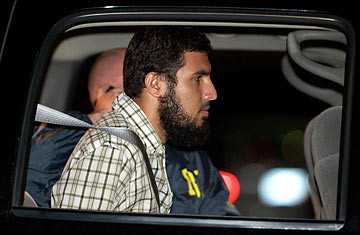
FBI agents arrest suspects Najibullah Zazi, 24, above, and his father Mohammed Zazi, 53, on the charges of knowingly making false statements to the FBI in a matter involving terrorism
With Najibullah Zazi formally indicted on terrorism-related charges, a clearer picture is emerging of what the FBI says was a plot to bomb civilian targets in the U.S. Indeed, officials now say this may have been the most dangerous terrorist plot since 9/11. Many of the details revealed in court documents are chilling. The Afghan-born Zazi, who has denied the charges, is accused of buying ingredients for making bombs and of "cooking" an explosive mixture at a motel in Colorado.
Many details, however, remain unclear: the plot's real targets, for instance, and just how far the plotters had gone before the FBI disrupted their plans. Here are three of the case's central questions that are still unanswered:
1. Why did he do it?
Is Zazi your common or garden-variety jihadi, fueled by the same inchoate hatreds that burn in Osama bin Laden's belly, or was he motivated by a narrower Afghan-nationalist agenda?
The worst-case scenario is that he may have been associated with the Taliban — in which case this might be the first time they have tried to attack U.S. interests outside Afghanistan and Pakistan. If the Taliban have joined al-Qaeda in taking the fight to the West, then counterterrorism and law-enforcement authorities will need to greatly expand the scope of their operations, at home and abroad. "If he's Taliban, then it greatly expands the universe of people you want to put under surveillance," says Bill Rosenau, a counterterrorism expert at Rand Corp.
On the other hand, If Zazi is an al-Qaeda operative, it would challenge the belief that Osama bin Laden and his cohort, on the run from American drones, no longer have the ability to strike on the U.S. mainland.
2. Who were his associates?
The FBI has indicated that Zazi was not working alone, that he was in touch with collaborators in the U.S. and in Pakistan. "We'd want to know who's behind them," says Rosenau. "If there's a network, then how far does it go?"
It's not yet clear that Zazi was the mastermind of the plot. "Was he the Mohammad Sidique Khan of this group?" asks a recently retired counterterrorism official, referring to the leader of the 2005 London bombers. "Or is the real leader still out there?"
If Zazi's associates turn out to be mostly Afghans, that would strengthen suspicions that the Taliban are no longer limiting themselves to the Pashtun lands.
3. Where was he recruited?
It's possible Zazi simply turned up in Peshawar and asked to be led to the nearest jihadi recruitment center. Plenty of terrorists have done that. Given his legal residency in the U.S., he would have been a great get for any of the terrorist groups that operate in the northern Pakistani city.
But if Zazi and his associates were recruited in the U.S., that's a greater concern. It would make them homegrown jihadis, in the same category as the men behind the Madrid and London bombings.
A long-held view among some counterterrorism experts is that American society does such a good job of absorbing immigrants that there's none of the ghettoization of poor Muslim communities commonly seen in Europe. Also, since the U.S. gives all newcomers the opportunity to get rich, there are none of the resentments that fester among young, unemployed Muslims in European cities. But some experts are beginning to question those assumptions. "We've had the complacency about our ability to integrate minorities into our society," says Robert Grenier, a former CIA station chief in Pakistan. "We've looked at what's happening in the U.K. and France and seen them as other people's problems."
There have been other signs that jihadi organizations are reaching out to disaffected young Muslims in the U.S. Consider the Somali-American youths who flew from Minneapolis to join al-Shabab, the al-Qaeda-linked militia that runs much of Somalia. If it turns out that it was al-Qaeda (or the Taliban) that reached out to Zazi and his associates — and not the other way around — then it would suggest that the U.S. is vulnerable to attacks from within.
